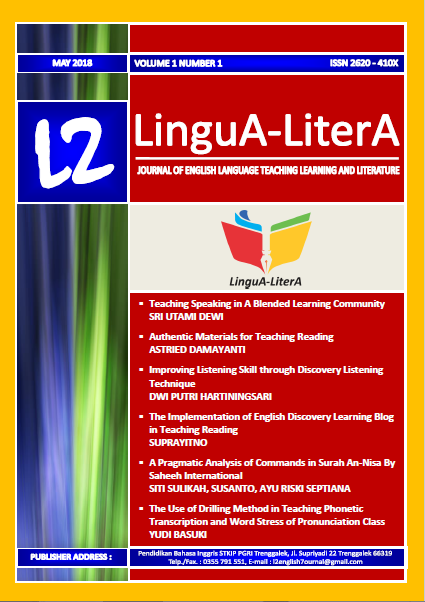Abstract
This research is aimed to describe precisely how an online learning using blog which is designed through discovery learning model approach be used in teaching reading at STKIP PGRI Trenggalek. This research is conducted to know how technology affects the learning process which is designed to appeal students’ curiosity and willingness in learning. Through this descriptive qualitative research, researcher gathers the data from the third semester students of English department who take reading lecture and be taught by using English discovery blog. In this research, the researcher becomes the human instrument, the main instrument of the research. The data are gotten through observation, interview and questionnaire which are given to the lecturers and the students of reading class. The data analysis includes the calculation of the students’ interaction with other participants and the lecturer, the percentage of the questionnaires’ result, and the qualitative analysis on the result of observation and interview. The result of this research shows that students are attracted in learning by using online media. Students feel that the blog used is quite easy to follow and the lay out can appeal their curiosity. The direct interaction with the lecturer and learning through this technology gives larger chance for students in learning reading. However, there are some problems occur during the use of the media such as the poor internet connection and the lack of equipment needed to access the blog
References
Arnold, N., Ducate, L., Lomicka, L., & Lord, G. (2005). Using computer-mediated communication to establish social and supportive environments in teacher education. CALICO Journal, 22(3), 537–566.
Balim, A.2009. “The Effects of Discovery Learning on Students’ Success and Inquiry Learning Skills”. Eurasian Journal of Education Research. https://www.researchgate.net/publication/298514123_The_Effects_of_Discovery_Learning_on_Students%27_Success_and_Inquiry_Learning_Skills. Accessed on 20th March 2018.
Brown, H., Douglas. 2007. Teaching by Principles. An Interactive Approach to Language Pedagogy. New York: Pearson Education.
Bunch, G. C., Kibler, A., & Pimentel, S. (2012). Realizing opportunities for English learners in the common core English language arts and disciplinary literacy standards. Stanford, CA: Understanding Language Initiative.
Dobson, T., & Willinsky, J. (2009). Digital literacy. In D. R. Olson & N. Torrance (Eds.), The Cambridge handbook of literacy (pp. 286–312). Cambridge, UK: Cambridge University Press.
Koehler, C., Bloom, M. A., & Milner, A. R. (2015). The STEM Road Map for Grades K–2. In C. C. Johnson, E. E. Peters-Burton, & T. J. Moore (Eds.), STEM road map: A framework for integrated STEM education (pp. 41–59). New York, NY: Routledge.
Pasi, Danilo. 2010. “The English Language And The Globalization”, (online), (http://www.arcos.org.br/artigos/the-english-language-and-the-globalization/ accesed on April 4th 2018)
Satar, H. Muge & Akcan, Sumru.2018. “Pre-Service EFL Teachers' Online Participation, Interaction, and Social Presence”. Language Learning & Technology, 22, pp. 157–183.
Warschauer, M. (1997). Computer-mediated collaborative learning: Theory and practice. Modern Language Journal, 81(4), 470–481

This work is licensed under a Creative Commons Attribution-ShareAlike 4.0 International License.
Copyright (c) 2021 Suprayitno Suprayitno

